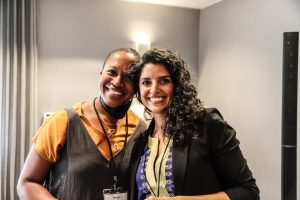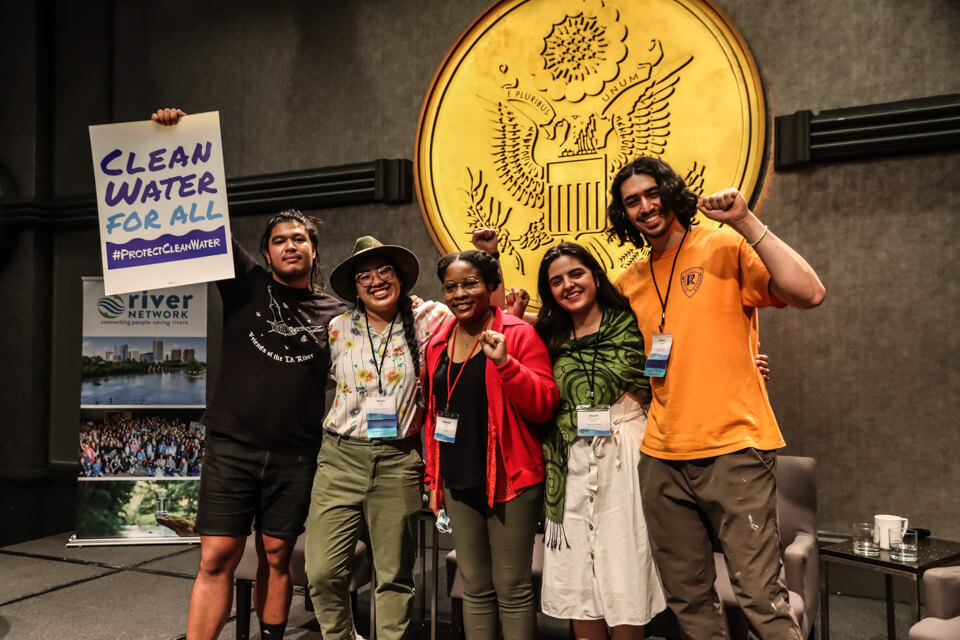A Profound Shift of Focus – Reflections on the 2022 River Rally
In recent years, a growing number of environmental organizations are addressing the issues of natural resource management in America’s cities. Though most had previously devoted their attention to the conservation of remote wilderness areas, many are now dedicating their efforts towards communities that have long been on the margins of our society. At its first national gathering since the Covid-19 Pandemic began in 2020, River Network brought together environmental leaders from across the country at River Rally in Washington D.C. to talk about how their work might shift its focus through the lens of racial and socio-economic equity.
As we celebrate the progress that the conservation movement has made in the 50 years since the passage of the Clean Water Act in 1972, many institutions are coming to grips with their responsibility to address the needs of urban communities that have been neglected for decades. Raj Shukla, the Midwest director of freshwater policy at the Nature Conservancy and a board member of River Network said bringing more people of color and other marginalized communities into the important work of environmental protection is a top priority. But he admits that his and other nonprofits have a long way to go before the equity they desire is achieved.
“We haven’t done a great job of keeping people in the environmental movement on issues of equity and diversity, of keeping people engaged once we recruit them,” Shukla said. “We want to change that.”
On the opening day of the 2022 River Rally, Donna Stephens, community engagement specialist at the Proctor Creek Stewardship Council, held court with fellow attendees over a continental buffet of scrambled eggs, bacon, fresh fruit and an assortment of pastries. The food and coffee service at the Capital Hilton Hotel offered ample sustenance to fuel the appetites of the many environmental advocates who gathered there. Each of them aimed to discuss and inspire one another’s respective interests in the critical issues surrounding the integrity of free-flowing bodies water across North America. Between bites of breakfast this passionate community leader from Atlanta, Georgia, defined with practiced ease the critical circumstances of the natural environment she has called home for most of her life.
“In the Proctor Creek Watershed we have flooding and poor water quality that’s making homeowners sell their houses for pennies on the dollar and developers are reselling these properties for millions,” Stephens said with a firm and steady voice. “We need to create policies and legislation that hold people accountable. There’s so much gentrification.”
In her predominately Black neighborhood within the Proctor Creek watershed, Stephens has witnessed first-hand the inequitable management of land and water resources that are a constant challenge to the more than 1,500 member organizations of River Network. The practice of driving low-income residents from urban neighborhoods is far too common in cities of all sizes across the United States. As the infrastructure required to maintain the purity of drinking water, mitigate storm surge runoff and manage municipal sewage systems are allowed to decline, property values fall along with the quality of life for area residents that seems to get worse year after year.
“During the Obama administration Proctor Creek was one of the 10 worst waterways in America,” Stephens said. “A few years ago, the Chattahoochee River was number one. And after you throw in the other factors of flooding and poor water quality, at one time, the city of Atlanta had the highest water rates, in terms of utility bills, of any city in the nation.”
It seems that only when homeowners are forced to sell their property do real estate developers and city planners make financial investments that significantly improve the living conditions of these ecologically distressed communities. But once gentrified, as Stephens argues, new or renovated homes on the same blocks that were once occupied by working-class Black and Latino families become unfordable. As people of color are being systematically priced out their neighborhoods, they are subjected as well to limited access to green space, nearby locations to purchase groceries and disproportionate exposure to industrial pollution.
Member organizations of River Network aim to more directly engage the communities that are immediately impacted by the ill-effects of environmental damage. Leaders like Stephens, who attend River Rally, are not only motivated to create lasting change, but they also possess the lived experience necessary to know what needs to be done. The prevailing wisdom among River Rally attendees suggests that environmental nonprofits should provide local advocacy organizations with the resources they need to be successful and simply get out of their way.
“The way that we’re trying to do it is to empower more leaders in conservation who come with a desire to address these issues as part of our conservation work. Let’s invest in the people who care,” said Shukla at the Nature Conservancy. “They have raised their hands to do this work. They want to be conservation leaders. Cool! They’re also here because they want to expand social justice. And we need to support them.”

Ronda Chapman during River Rally, with Yasmin Zaerpoor, Director of Water Equity and Climate Resilience at PolicyLink. Photo by James Mills.
But many environmental organizations are coming to realize that they must also work to change the cultural environments within their own institutions. The work of diversity, equity and inclusion in the field of conservation may include a transformation as well of a group’s workforce, hiring practices and maybe even the roles of senior management. As director of equity at the Trust for Public Land, Ronda Chapman, who also serves on the board of River Network, soon realized that her majority white organization needed to change in order to best serve the interests of communities of color.
“It’s really hard to ask folks to talk about it externally when they don’t see it happening among our teams and when folks have just been sitting on their hands with these questions about the different dynamics that are showing up inside the organization,” she said. “This conversation has been taking place for the last few years. But now we’re actually ready to activate it. And I’m excited to be the person to lead that.”
A big part of Chapman’s strategy is to first dispel the myth that “these are white issues”. Perhaps as an artifact of past racial discrimination that deprived communities of color of equitable access to fresh drinking water, clean air free of pollutants and green spaces for recreation, these basic human necessities have been relegated to the purview of municipalities and service organization that favor the priorities of the dominant, mostly white, culture.
“I want everybody to know that they have a right to these spaces, and they have a right to challenge our institutions,” Chapman said. “I think that what folks need to understand is a lot of those inside our organizations, our institutions, don’t know what they don’t know. So we need the community to hold us accountable to them. We need them to tell us what we’re doing wrong or how to do better. Everybody thinks that they’re doing the right thing. Sometimes, they just aren’t.”
Though attending River Rally for the first time in person, Megan Nguyen is the 2020 recipient of River Network’s Emerging Leader Award. In addition to her dynamic enthusiasm, Nguyen brought to the event a youthful perspective that the environmental conservation movement desperately needs. At one of the panel discussions titled, “Doing Better – Climate, Water, and Equity at the Local Level,” Nguyen was especially outspoken in her criticism of organizations that seemed to be talking down to their constituents rather than engaging the lived experiences of the very people they aim to serve. “You’d think a plenary called that would be talking about what we can do at a local level to speak truth to power, about equity,” she said. But we didn’t have that. We just had some EPA, federal people. That is not local. That’s not bottom up. That’s top down. I wanted to hear from people on the ground, those actually doing the work.”

Megan Nguyen, second from left, with fellow River Rally attendees. Photo by James Mills.
Nguyen said she enjoyed most every other aspect of the River Rally, but she felt that this panel discussion was reflective of much still must change to bring true equity into the conservation movement. As a social activist, Nguyen believes that the very architecture of how we even conduct conferences must be different.
“Those structures come from the corporate structures, the nonprofit industrial complex. If we’re actively trying to break away from that, we have to look at not just the content, but also the structures and how we present these things,” she said. “When you have a top-down panel, people already know how to behave in those areas. They’re just being taught. People need to talk with each other, not just sit, watch, and listen.”
The cultural changes that River Rally attendees aspire to accomplish may involve a fundamental revision of how they do business and work with the public as a whole. Not only should agencies be more responsive to the interests of community members they must also shift their communication style to acknowledge and directly address their main concerns. Chapman at the Trust For Public Land said that in many ways the conservation movement needs to change the how agencies talk to emerging communities of color by using language that speaks to their priorities as people and not the jargony expressions of environmental protection or natural resource preservation.
“Instead, I would love to invite them to have a different type of conversation and to say, ‘well, what do you call it?’” Chapman said. “Some folks might say. ‘I call it living. I’m simply just trying to live. I want to wake up. I want to drink fresh water. I want to breathe clean air, and I want to eat whole foods.’ And it’s as simple as that.”




